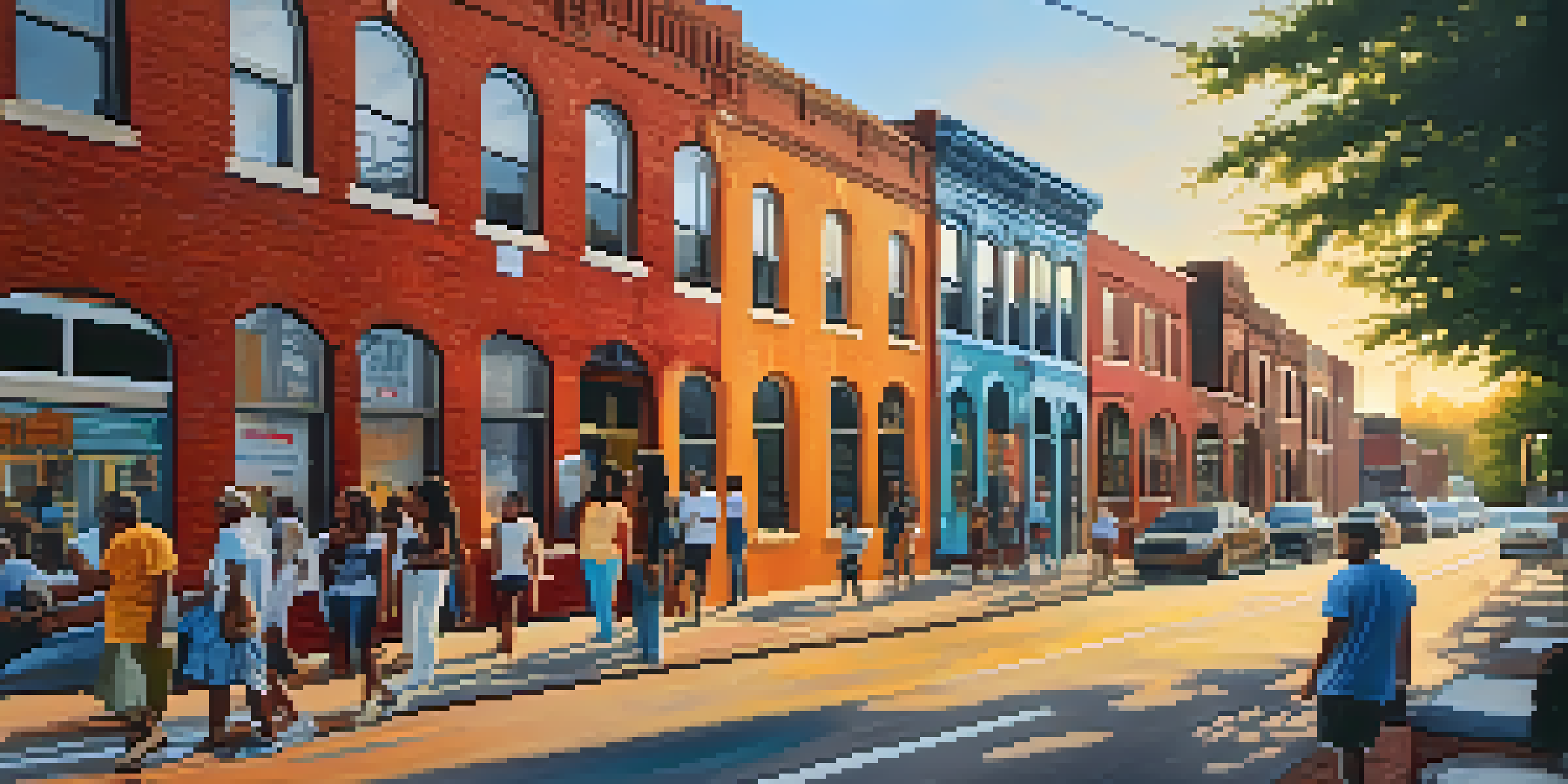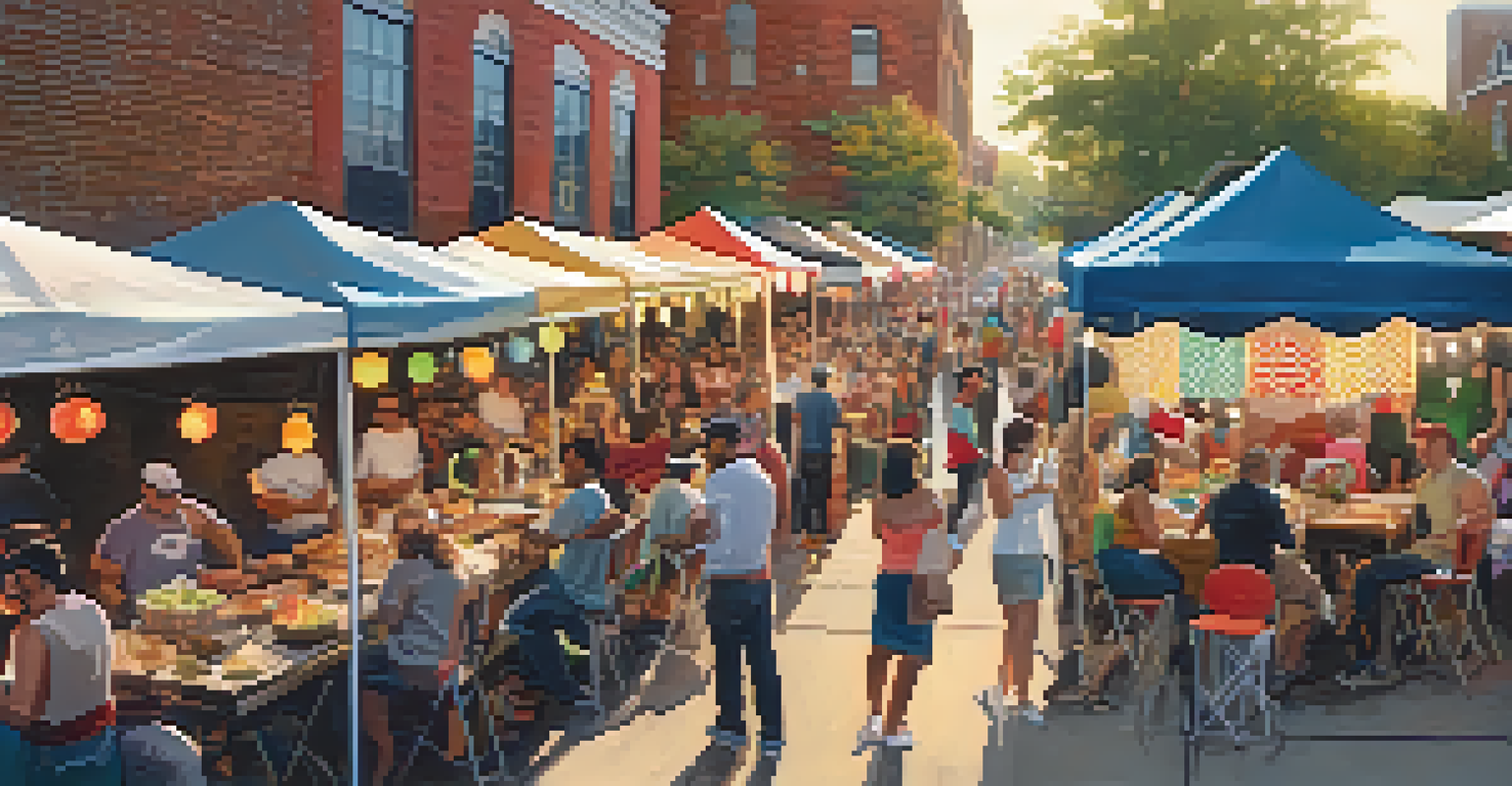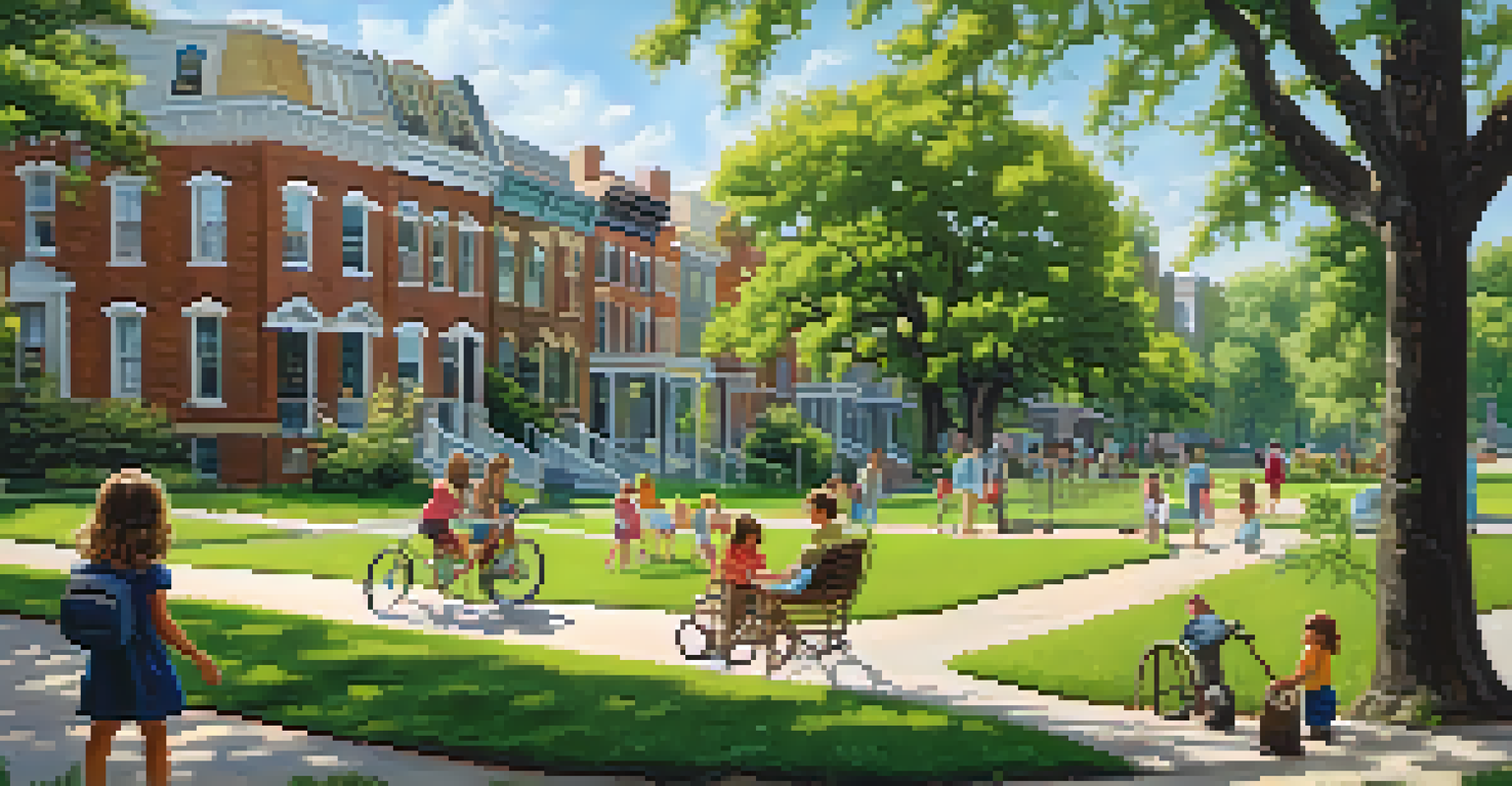The Legacy of Old Fourth Ward: Atlanta's Cultural Hub

A Brief History of Old Fourth Ward
Old Fourth Ward, often referred to as O4W, has a rich history that dates back to the 19th century. Originally developed as a residential area, it became a vibrant community for African Americans post-Civil War. This neighborhood has witnessed significant changes, from its days of prosperity to periods of decline, making its revival all the more remarkable.
The greatness of a community is most accurately measured by the compassionate actions of its members.
In the mid-1900s, the area faced challenges due to urban decay and economic downturns that led to a decline in its population. However, the spirit of the community remained strong, and efforts were made to revitalize the neighborhood. Today, Old Fourth Ward stands as a testament to resilience and cultural evolution.
The legacy of Old Fourth Ward is not just about its past; it reflects the ongoing journey of its community. As new developments blend with historical elements, the area continues to celebrate its unique identity, making it a fascinating place to explore.
Cultural Significance of Old Fourth Ward
Cultural heritage is woven into the fabric of Old Fourth Ward, with sites that tell the stories of its residents. The neighborhood is home to the Martin Luther King Jr. National Historical Park, honoring the legacy of the civil rights leader. This site attracts visitors from around the world, showcasing the area's pivotal role in the civil rights movement.

In addition to its historical significance, Old Fourth Ward is a hub for modern culture, featuring art galleries, music venues, and festivals. The area thrives on creativity, with local artists and musicians contributing to a vibrant scene. This blend of history and contemporary culture makes it a unique destination for both residents and tourists.
Rich History of Old Fourth Ward
Old Fourth Ward's evolution from a vibrant African American community post-Civil War to a revitalized urban hub highlights its resilience and cultural significance.
The cultural significance of Old Fourth Ward is evident in its community events, which often celebrate its rich heritage. From street festivals to art walks, these gatherings foster a sense of belonging and pride among residents, ensuring that the neighborhood's cultural legacy continues to thrive.
Revitalization Efforts in the Neighborhood
Over the past few decades, Old Fourth Ward has undergone significant revitalization, transforming it into a lively urban hub. Initiatives to restore historic buildings and promote local businesses have breathed new life into the area. This revitalization is a collaborative effort between community leaders, residents, and city planners.
Art is the most beautiful of all lies; it is the truth that is most beautiful.
One of the most notable projects is the Atlanta BeltLine, an ambitious redevelopment initiative that connects various neighborhoods, including Old Fourth Ward. The BeltLine has introduced parks, trails, and public art, making the area more accessible and enjoyable for everyone. This project has not only enhanced the physical landscape but has also fostered community engagement.
As revitalization continues, it’s important to balance development with the preservation of the neighborhood's heritage. Community discussions and involvement are key to ensuring that the unique character of Old Fourth Ward is maintained, allowing it to flourish while honoring its past.
Old Fourth Ward's Culinary Scene
Food lovers will find a diverse culinary scene in Old Fourth Ward that reflects its rich cultural tapestry. From soul food restaurants to trendy eateries, the neighborhood offers a taste of Atlanta's gastronomic offerings. This variety not only satisfies cravings but also tells the story of the area’s cultural influences.
Local favorites include eateries that serve traditional Southern cuisine, providing a comforting connection to the past. However, the culinary landscape is continually evolving, with chefs experimenting and introducing new flavors. This blend of classic and contemporary creates a dynamic dining experience that attracts food enthusiasts.
Cultural and Culinary Diversity
The neighborhood boasts a rich culinary scene and vibrant arts culture, reflecting its diverse heritage and fostering community engagement through events and local businesses.
Beyond individual restaurants, Old Fourth Ward hosts food festivals that celebrate local flavors and culinary talent. These events foster community spirit and allow residents to come together, sharing not only meals but also stories and traditions that enrich the neighborhood’s cultural fabric.
Art and Creativity in Old Fourth Ward
Art is a cornerstone of Old Fourth Ward’s identity, with murals and installations adorning many buildings. The neighborhood serves as an outdoor gallery, showcasing local artists and their creativity. This vibrant public art scene reflects the community's values and stories, inviting both admiration and reflection.
In addition to visual arts, Old Fourth Ward hosts various cultural events that spotlight local talent. From music festivals to theater performances, these events foster creativity and provide a platform for artists to share their work. The arts scene is not just about entertainment; it's a vital part of community engagement and identity.
The collaboration between artists and the community is crucial in maintaining this creative momentum. Initiatives that encourage public participation in art projects help to bridge the gap between artists and residents. As Old Fourth Ward continues to grow, its commitment to art and creativity remains a defining characteristic.
Community Engagement and Activism
Community engagement is a vital aspect of life in Old Fourth Ward, where residents actively participate in local initiatives. Neighborhood associations and advocacy groups work tirelessly to address issues and promote positive change. This grassroots involvement fosters a sense of ownership and pride among residents.
Activism in Old Fourth Ward often revolves around social justice, affordable housing, and preserving the neighborhood's cultural heritage. Residents come together to voice their concerns, ensuring that their needs and values are represented in community planning. This collective spirit strengthens the bond between neighbors and enhances the overall quality of life.
Community Engagement Drives Change
Active resident participation in initiatives and activism for social justice and heritage preservation shapes the future of Old Fourth Ward, ensuring inclusivity and sustainability.
Through community events and discussions, residents of Old Fourth Ward continue to shape their neighborhood's future. This commitment to activism not only addresses current challenges but also honors the legacy of those who fought for equality and justice before them.
Future Prospects for Old Fourth Ward
As Old Fourth Ward continues to evolve, its future looks promising. Ongoing developments aim to enhance the neighborhood while respecting its historical significance. The challenge lies in ensuring that growth benefits all residents, particularly those who have long called Old Fourth Ward home.
Community leaders and stakeholders are working together to create a sustainable vision for the area. This includes initiatives focused on affordable housing, improved infrastructure, and access to amenities. Such planning is essential to maintain the neighborhood's character amidst rising property values and gentrification.

The future of Old Fourth Ward is a collaborative effort, one that embraces its past while looking forward to new possibilities. By fostering community dialogue and engagement, the neighborhood can thrive as a cultural hub that honors its legacy while welcoming new residents and ideas.